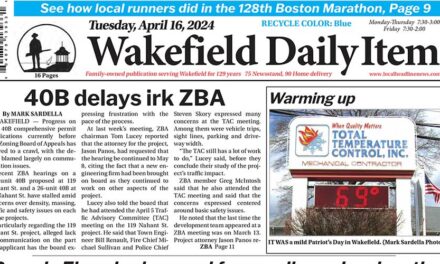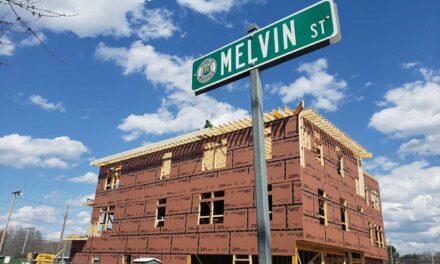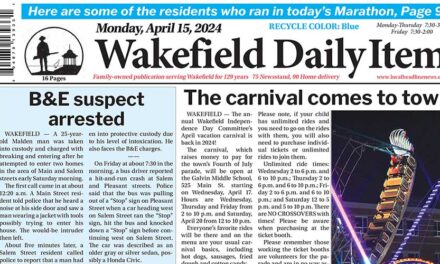Published in the July 16, 2015 edition
By MARK SARDELLA
WAKEFIELD — Two local stores will have to pay a $200 fine and have their licenses to sell tobacco products suspended for seven days after each failed compliance checks by selling tobacco products to an underage buyer for the second time within a 24 month period.
The legal age for the purchase of tobacco products in Wakefield is 21.
The Board of Health held hearings last night on the cases of Tufts Convenience Store in Greenwood Plaza and Andy’s Liquors (formerly Jeffrey’s Package Store) at 354 Main St.
In the case of Tufts Convenience, Health Director Ruth Clay told the board that on March 5, 2015, Marlboro cigarettes were sold to an underage buyer and a $100 fine was paid. The second offense came on June 20, 2015, when a 16-year-old was able to purchase Game Cigarillos.
The owner of Tufts convenience admitted that his store clerks did twice sell tobacco to minors but pleaded his case, agreeing to pay the fine but asking for a break on the suspension. He said that after the first offense, he sent that clerk to work at another store and after a second clerk sold to a minor, that clerk was fired. He said that a seven-day suspension would “ruin the business.”
The owner said that both clerks were carefully trained but he promised that going forward employees will be even “more cautious and serious” about tobacco sales.
But Board of Health chairman Alison Mehlman said that under the regulations the board had no discretion with respect to the penalty in cases where a store has sold tobacco to a minor twice in a two-year period. Clay said that the $200 fine and seven-day suspension were standard penalties in communities across the state.
It was agreed that Tufts Convenience would serve its suspension and be prohibited from selling tobacco products from Sunday, July 26 through Saturday, Aug. 1.
Clay stressed that all tobacco products must be removed from the shelves during the suspension period and stored in the back room.
In the case of Andy’s Liquors, Clay told the board that the store sold Newport cigarettes to a 16-year-old boy on April 3, 2015 and sold Marlboros to an underage buyer on June 20, 2015.
The owners of the store had already paid the $200 fine and agreed to serve the seven-day tobacco license suspension from July 26 through Aug. 1.
The board discussed proposed updates to its tobacco regulations to address the problem of “flavored” tobacco products that are especially aimed at youth. Some of the products try to get around restrictions on flavored products by marketing them under colors like “purple” or “green.”
The board also talked about cigarillos and “little cigars” sold for as little as 99 cents. They discussed establishing a much high minimum price for such products in order to price them out of the reach of kids.
—————
The board met with Christopher Francazio of 31 Druid Hill Ave. to discuss his concerns about the impact that blasting at a nearby development could have on his well. Druid Hill Avenue homes have wells because the street is not served by town water.
Francazio was not only concerned about the damage that the blasting might do to his well, he noted that 10 new homes built on the street would also be served by wells. He wondered if that many additional wells could affect his ability to get water from his own well.
He also was worried about the blasting because he has an underground propane tank on his property.
Clay said that the Health Department had limited options in such cases but would contact the Department of Environmental Protection. She said that there is a regulation that may allow for a consultant to be hired at the developer’s expense.
Beyond that, she suggested that a homeowner’s only recourse may be to consult an attorney if any damage does occur.
—————
Clay provided the board with some new information on the town’s massage parlor issue. Residents have raised concerns and the police have raided several local massage parlors believed to be fronts for prostitution.
In 2008, the state took over regulation of massage parlors previously regulated by local boards of health, but left out certain types of establishments, including those using the name “body work.”
Clay said that a graduate student intern had done some research on various types of massage modalities and their professional and educational standards for practitioners. Local boards of health can only apply local regulations to those modalities that the state does not define as “massage,” including some that use the description “body work.”
Clay did stress that there are legitimate body work establishments operating in Wakefield. She said that she would look at ways to update Wakefield’s old massage regulations to allow the Health Department to regulate some of the establishments operating in Wakefield.
“It looks like we may be able to tweak our old regulations to include a lot of these,” Clay said.




